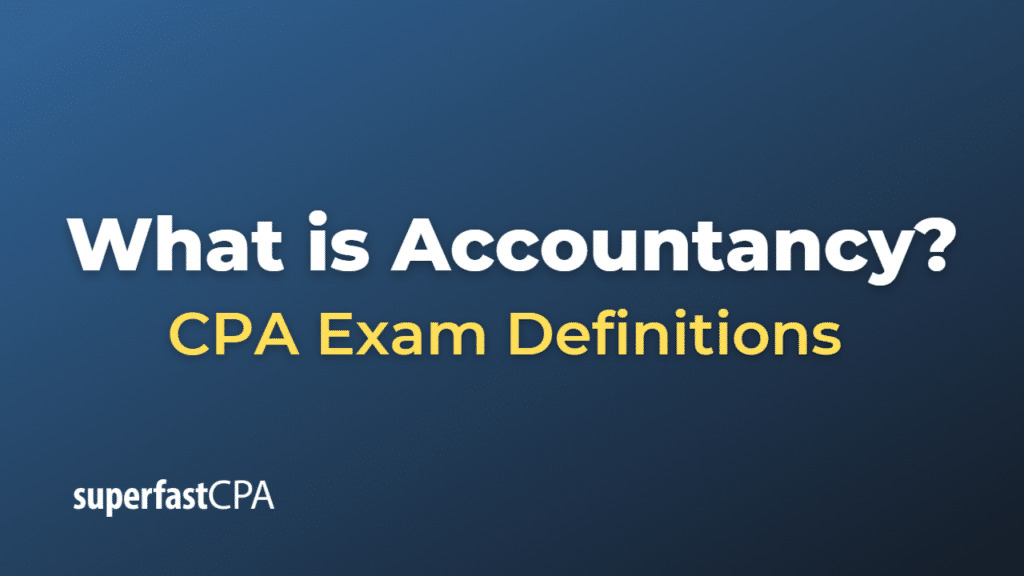Accountancy
Accountancy, also known as accounting, is the practice of recording, analyzing, interpreting, and reporting financial transactions and information for businesses, organizations, or individuals. It is a systematic process that enables stakeholders, such as management, investors, creditors, and regulators, to make informed decisions about the financial health and performance of an entity.
Accountancy encompasses a wide range of activities and functions, including:
- Bookkeeping: The process of recording financial transactions in a systematic and chronological manner, typically in the general ledger, which forms the basis for preparing financial statements.
- Financial accounting: The preparation and presentation of financial statements, such as the balance sheet, income statement, and cash flow statement, in accordance with accounting principles and standards, to provide external users with information about an entity’s financial performance and position.
- Management accounting: The analysis and interpretation of financial and non-financial information for internal decision-making, planning, and control purposes, such as budgeting, forecasting, cost management, and performance evaluation.
- Auditing: The examination and verification of an entity’s financial statements and underlying records by an independent auditor, to provide assurance about the reliability and accuracy of the reported information.
- Tax accounting: The preparation and filing of tax returns, as well as planning and consulting on tax matters, to ensure compliance with applicable laws and regulations and minimize tax liabilities.
- Financial analysis: The assessment of an entity’s financial performance, stability, and growth potential, using various tools and techniques, such as ratio analysis, trend analysis, and financial modeling.
Accountancy plays a crucial role in the efficient functioning of the economy, as it provides stakeholders with reliable and relevant financial information that facilitates decision-making, resource allocation, and performance evaluation. Professionals in the field of accountancy, such as accountants and auditors, are responsible for maintaining the integrity and transparency of financial reporting, which contributes to the stability and credibility of the financial markets and the overall business environment.
Example of Accountancy
Let’s look at an example of how accountancy plays a role in a small business, “XYZ Coffee Shop.”
XYZ Coffee Shop is a small business that operates in the local community, serving coffee and snacks to its customers. The owner of the coffee shop needs to manage various financial aspects of the business, and accountancy helps them achieve that. Here’s how different accountancy functions come into play:
- Bookkeeping: The owner records daily transactions, such as cash sales, inventory purchases, and expenses, in the general ledger. This helps them track the cash inflows and outflows and maintain accurate financial records.
- Financial accounting: The owner prepares financial statements, including the income statement, balance sheet, and cash flow statement, to provide an overview of the financial performance and position of the coffee shop. These statements are useful for external stakeholders, such as investors or lenders, who may have an interest in the business.
- Management accounting: The owner analyzes the financial information, such as sales trends, product profitability, and customer preferences, to make informed decisions about pricing, inventory management, and marketing strategies. This helps improve the coffee shop’s operations and profitability.
- Auditing: If the coffee shop reaches a certain size or has external investors, an independent auditor may be required to review the financial statements and provide assurance about their accuracy and reliability.
- Tax accounting: The owner ensures compliance with tax regulations by preparing and filing the necessary tax returns and making appropriate tax payments. They may also engage in tax planning strategies to minimize the coffee shop’s tax liabilities.
- Financial analysis: The owner evaluates the coffee shop’s financial performance, such as profit margins, liquidity, and solvency, using various financial ratios and metrics. This helps them identify areas of strength and weakness, set financial targets, and monitor progress towards achieving those targets.
In this example, accountancy plays a crucial role in managing and assessing the financial aspects of XYZ Coffee Shop. It helps the owner maintain accurate financial records, make informed decisions, monitor performance, and ensure compliance with relevant laws and regulations. By utilizing various accountancy functions, the owner can effectively manage the coffee shop’s finances and drive its success.













